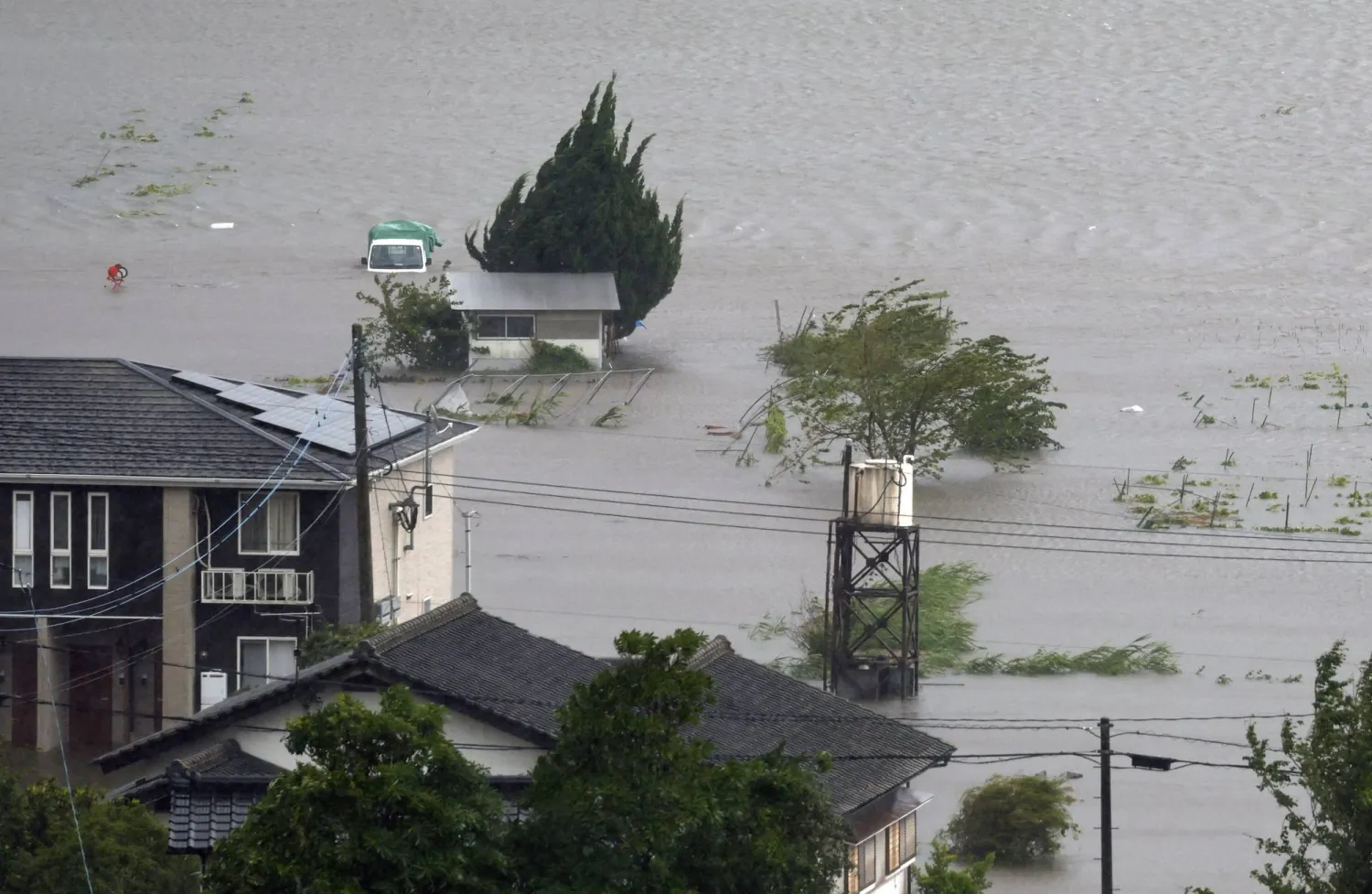Typhoon Shanshan weakened to a tropical storm Friday but was still dumping heavy rains as it slowly churned through Japan, triggering transport havoc and landslide warnings, with up to six people killed.
The storm, which at landfall was one of the fiercest to hit Japan in decades, pummeled Kyushu island on Thursday with gusts of up to 252 kilometers (157 miles) per hour. On Friday they eased to 108 kph as it moved up the archipelago.
Even before making landfall, a landslide caused by the heavy rains preceding the storm killed three members of the same family late Tuesday in Aichi prefecture, around 1,000 kilometers (600 miles) away.
Government spokesman Yoshimasa Hayashi on Friday confirmed reports of one additional death, but said that "the relation to the typhoon was being studied". Two more were feared dead and two others were missing, he added.
Eight people were seriously hurt and 70 others had light injuries, Hayashi said, with many injured by broken glass after the typhoon smashed windows and ripped tiles off roofs on Thursday. Almost 200 buildings were damaged.
- Climate change -
Typhoons in the region have been forming closer to coastlines, intensifying more rapidly and lasting longer over land due to climate change, according to a study released in July.
A rapid attribution analysis issued Friday by Imperial College London using peer-reviewed methodology calculated that Typhoon Shanshan's winds were made 26 percent more likely by a warming planet.
"Without phasing out fossil fuels, the root cause of climate change, typhoons will bring even greater devastation to Japan," said Ralf Toumi, director of the Grantham Institute at Imperial.
The coming storm prompted Japanese authorities to issue their highest alert in several areas, with more than five million people advised to evacuate, although it was unclear how many did.
On Friday the Japan Meteorological Agency issued alerts for possible landslides in many parts of Kyushu, and as far away as Shizuoka on the main island of Honshu, the Tokyo region and nearby Kanagawa.
Footage from Japanese broadcaster NHK showed a car park in Kanagawa prefecture with vehicles half-submerged in brown water, with authorities there urging residents to move to higher floors after a local river flooded.
Some parts of Kyushu saw record rains for August, with the town of Misato recording a staggering 791.5 millimeters (31 inches) in 48 hours, the Japan Meteorological Agency said.
Kyushu island's Kitakyushu saw 474 mm in the 24 hours to Friday morning, the most since 2012, when comparative data began to be collected. Nearby Kunimi had 384.5 mm, the most since records began in 1977.
- Inconvenient -
The holiday resort of Beppu in Kyushu suffered no major damage, but tourists were stranded and bored, with the onsen hot springs, a monkey park and even 24-hour convenience stores shut.
"This is my first time (here). I was very looking forward to it," morose visitor Nobuhiko Takagishi from Tokyo told AFP. "But it will be a trip to remember. A trip when I couldn't do anything."
Power cuts hit more than 250,000 Kyushu households, but the utility operator said Friday that only 5,250 were still without electricity as engineers repaired transmission lines.
Overnight, many motorways were fully or partially closed in Kyushu, as were others further afield, media reports said.
Shinkansen bullet trains remained suspended in Kyushu and were also halted on the major route between Tokyo and Osaka, with operators warning of disruptions elsewhere.
Japan Airlines and ANA had already announced the cancellation of more than 600 flights between them for Friday, having scrapped a similar number the previous day, affecting almost 50,000 passengers.
Four baseball games due to take place on Friday, Saturday and Sunday in the central city of Nagoya and Nishinomiya near Osaka were canceled. Five J-League football matches slated for Saturday in different cities were also called off.
Auto giant Toyota said it had extended a production halt at all 14 of its Japanese plants, while a suspension at Nissan's Kyushu factories remained in place.
Weakening Typhoon Churns Through Japan, Up to Six Dead

A farmland is submerged due to floods caused by heavy rains from Typhoon Shanshan in Yufu, Oita Prefecture, southwestern Japan, August 29, 2024, in this photo taken by Kyodo. Mandatory credit Kyodo/via REUTERS

Weakening Typhoon Churns Through Japan, Up to Six Dead

A farmland is submerged due to floods caused by heavy rains from Typhoon Shanshan in Yufu, Oita Prefecture, southwestern Japan, August 29, 2024, in this photo taken by Kyodo. Mandatory credit Kyodo/via REUTERS
لم تشترك بعد
انشئ حساباً خاصاً بك لتحصل على أخبار مخصصة لك ولتتمتع بخاصية حفظ المقالات وتتلقى نشراتنا البريدية المتنوعة







